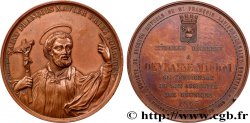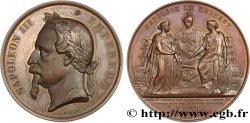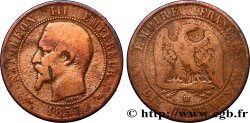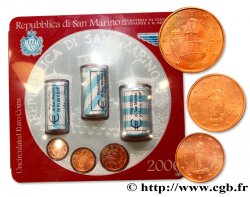fme_999478 - SECOND EMPIRE Médaille, Guiseppe Garibaldi, Dictateur de la Sicile
18.00 €约 151.20 CNY
数量
加入购物车

种类 Médaille, Guiseppe Garibaldi, Dictateur de la Sicile
日期: 1860
铸币厂名称/城市 Italie, Sicile
材质 copper
直径 23,50 mm
模子方针 12 h.
重量 4,22 g.
侧面 lisse
印模 sans poinçon
关于品相的说明
Patine hétérogène avec des traces d’usure, quelques coups et rayures. Présence de tâches d’oxydation
正面
正面的文字 GUISEPPE - GARIBALDI.
正面的说明书 Buste à droite du général Garibaldi, commandant des chasseurs alpins pendant la guerre d’indépendance italienne.
背面
背面的文字 GUERRE DE L’INDEPENDANCE ITALIENNE - 1860 // DICTATEUR / DE LA / SICILE.
背面的说明书 Légende en 3 lignes dans une couronne de lauriers.
评论
Garibaldi est un personnage fondamental du Risorgimento italien, pour avoir personnellement conduit et combattu dans un grand nombre de campagnes militaires qui ont permis la constitution de l’Italie unifiée. Il a essayé, le plus souvent, d’agir sous l’investiture d’un pouvoir légitime, ce qui ne fait pas de lui à proprement parler un révolutionnaire : il est nommé général par le gouvernement provisoire de Milan en 1848, général de la République romaine de 1849 par le ministre de la Guerre, et c’est au nom et avec l’accord de Victor-Emmanuel II qu’il intervient lors de l’expédition des Mille..
Garibaldi is a fundamental figure of the Italian Risorgimento, for having personally led and fought in a large number of military campaigns that allowed the constitution of a unified Italy. He tried, most often, to act under the investiture of a legitimate power, which does not make him strictly speaking a revolutionary: he was appointed general by the provisional government of Milan in 1848, general of the Roman Republic in 1849 by the Minister of War, and it was in the name and with the agreement of Victor Emmanuel II that he intervened during the Expedition of the Thousand.
Garibaldi is a fundamental figure of the Italian Risorgimento, for having personally led and fought in a large number of military campaigns that allowed the constitution of a unified Italy. He tried, most often, to act under the investiture of a legitimate power, which does not make him strictly speaking a revolutionary: he was appointed general by the provisional government of Milan in 1848, general of the Roman Republic in 1849 by the Minister of War, and it was in the name and with the agreement of Victor Emmanuel II that he intervened during the Expedition of the Thousand.








 对产品描述纠错
对产品描述纠错 打印
打印 分享我的选择
分享我的选择 提问
提问 Consign / sell
Consign / sell
 产品介绍
产品介绍










